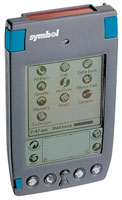Why a dumb phone and a smart tablet may be better

Editor's Note: This is a guest post by Russell Fox, a database administrator and mobile computing junkie in Sacramento, CA. He holds a Bachelor of Arts in English from U.C. Davis and enjoys playing and designing board games. He has no relationship with any of the manufacturers he writes about.
I got my first PDA around Christmas of 2000: a Symbol SPT1500. Don't feel bad if you’ve never heard of it -- it's an old Palm Pilot with an integrated barcode scanner used for inventory tracking. I certainly didn’t need a barcode scanner, but I worked for Symbol at the time, now a division of Motorola, and was so excited when the boss gave me a beaten-up demo unit.
Back then, I wasn’t exactly an early adopter of new technologies. I had just gotten my first demi-brick Nokia phone and my desktop was from the early 90’s, but my Palm and I became inseparable. I learned expert Graffiti and transferred all of my contacts and calendar items from my phone to my Palm. I could effectively while away hours at a coffee shop, writing short messages or ideas and later syncing them to my PC. It was truly an amazing device for the time.
The romance, however, was short-lived. New contacts meant double data entry, first into the Palm and then into the phone. In the morning I had to remember where I’d left both devices. And worst of all, I had precious little pocket space for anything else since neither device was exactly svelte. I stopped using the Palm after about six months, and even when I upgraded to a Sony CLIE, the magic was gone.
Of course, the smart phone negated the need for two devices, and I’m currently using a Blackberry Storm which has served me faithfully for two years despite an unfortunate incident involving an Irish stew. The poor SurePress screen has never been quite the same. With my Verizon contract coming up in March 2011, I’ve been immersed in researching a replacement for “Old Irish”, religiously reading every review and news tidbit I can find.
However, as I was sitting at lunch the other day, thumbing through page after page of device and OS reviews and news on the Storm, I started thinking about pads. Wouldn’t this whole lunchtime experience be better with a nice, big screen, fast web experience, and maybe a stand to hold it up while I eat my lunch? But then I’ll be back in the land of two devices, and this time there simply won’t be enough pocket space. If I want the pad with me at lunchtime, I’ll need to keep a backpack or case with me at all times. For me, that’s not a deal breaker: I’ve basically had a laptop on my person every day for the last three years.
The pad is a new type of device, and kudos to Apple for making such a strong showing right out of the gate. Once again, I took it off my list for reasons of development freedom. It looks like the oft-promised Android pads are waiting for Gingerbread to set them free, and so they might not be ready for prime-time by March. The current offerings like the Galaxy Tab are underpowered, too small, or both. Why have a large phone that isn’t a phone? The Blackberry Playbook is in the same boat, and I was looking to unload my Storm, but they make a strong case for having a WiFi-only pad connected to a 3G phone. If you’re going to have both devices anyway, why not have two that work together well?
And that got me to thinking about those two devices and how much functionality they’ll have in common. Everything “smart” I currently do on my smart phone, web browsing, emailing, texting, calendaring, and gaming, can now be done on the larger, more comfortable pad device. Why pay for smart phone functionality that I’m not going to use? Why not get a super-cheap phone that’s just a phone, putting the data plan and getting the carrier subsidy on a 3G pad?
I would gain pocket space because a “dumb” phone is no bigger than a stick of gum, and fishing a pad out of a backpack won’t be much more difficult than fishing a phone out of a pocket, so urgent emails or a quick web search will be a snap. I’d still need contact information on both devices, but decent sync program will take care of that.
Maybe the future is a dumb phone and a smart pad. Maybe my smart phone is just too smart.
See also:
